If you’re doing intermittent fasting, and you look for something to help you reduce excess weight, I will explain how coconut oil can help, and if you can eat coconut oil on an empty stomach?
You can eat coconut oil on an empty stomach because it’s got medium-chain fatty acids that get passed directly to the liver, without being deposited as fat. Therefore, the faster metabolic conversion is generating the energy that is immediately used by organs and muscles.
Promoting coconut oil, which is high in saturated fats, appears counter-intuitive. Especially for people who are seeking out to reduce excess weight. And if you look up online you will get, as usual, many conflicting opinions. However, if you look up close at the coconut oil chemical properties, you will notice a huge difference from other saturated fats.
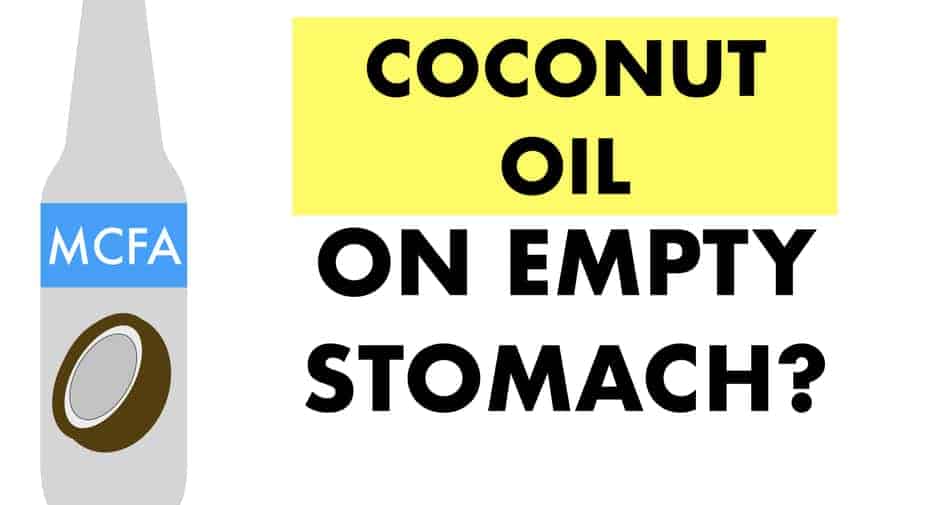
Coconut Oil First Thing In The Morning
Taking coconut oil first thing in the morning will suppress your appetite and cravings, and still, keep you in ketosis (fasted state). Coconut oil contains 62–70 % of medium-chain fatty acids that are metabolized differently, comparing to the saturated fats commonly found in the diet.
This means eating coconut oil first thing in the morning will not only give you satiety but also energy. For people who are doing intermittent fasting or simply seeking out to reduce calorie intake, having a spoonful of coconut oil in the morning will help suppress their appetite.
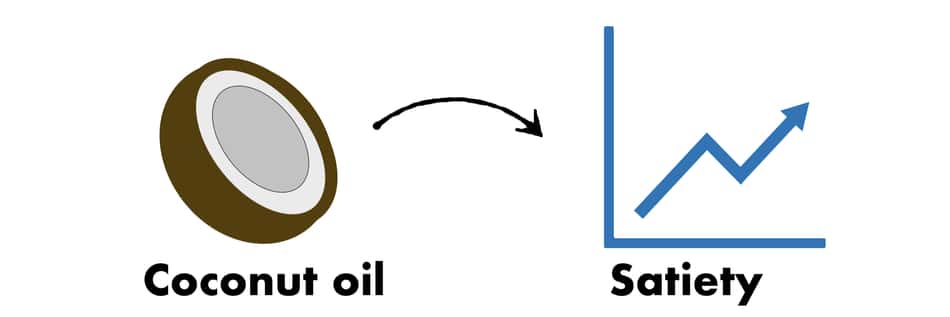
Benefits of Coconut Oil In The Morning On Empty Stomach
There are several benefits of taking coconut oil on empty stomach including appetite suppression, lowering hunger, increased postprandial energy expenditure, maintaining blood sugar levels, enhanced ketone bodies formation, and immediate energy conversion in the liver.
So there are a lot of benefits from having a small amount of coconut oil in the morning. Here are some exciting studies about coconut oil.
People who consumed coconut oil have greater resting energy expenditure (source). That means your body will burn more calories at rest, comparing to eating regular long-chain fatty acids that are found on vegetable oils.
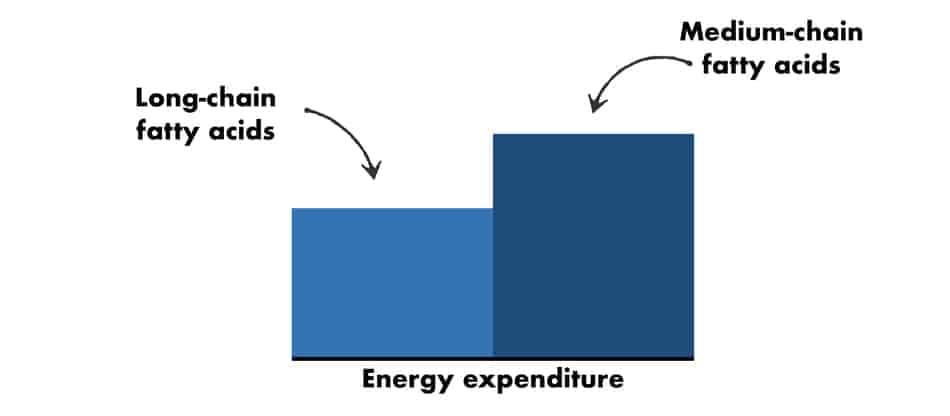
Medium-chain fatty acids that are found in coconut oil increase satiety compared to long-chain fatty acids (source). They showed that medium-chain fatty acids in the solid form provided slightly more satiety, fullness, and lower hunger sensation, compared to medium-chain fatty acids in liquid form.
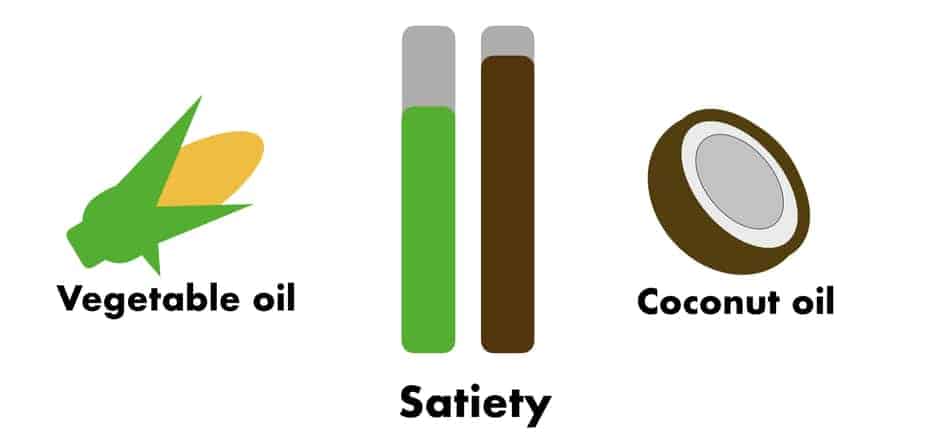
Consuming medium-chain fatty acids, as a non-carbohydrate energy source, enhance the formation of ketone bodies (AcAc, 3-β-hydroxybutyrate (3HB), and acetone) (source).
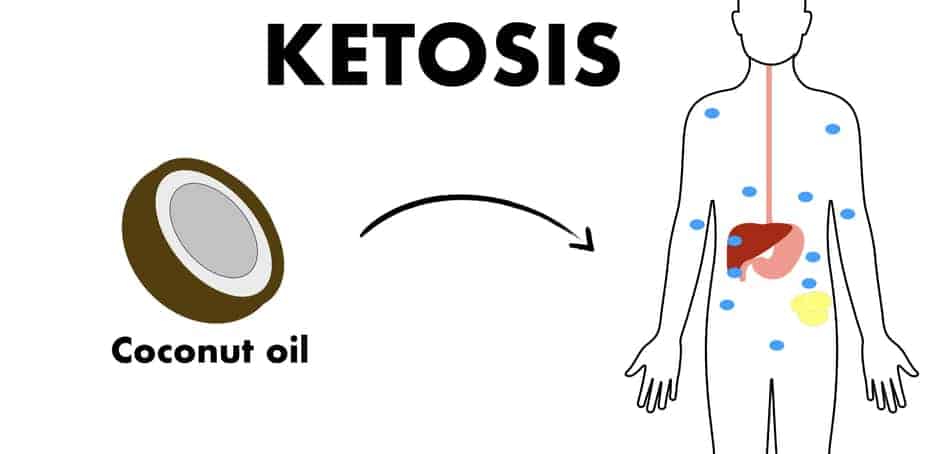
Coconut oil has a high number of phenolic acids (p-Coumaric acid, ferulic acid, caffeic acid, and catechin acid) and phytochemicals, also known as polyphenols. Phenolic acids and polyphenols have high antioxidant properties (source).
Also, medium-chain fatty acids are found in the coconut oil supply around 8 kcal/g, where long-chain fatty acids supply around 9 kcal/g. That is 10% fewer calories than regular oil/fat (source).
Now, before you get excited about all the benefits, please remember that coconut oil is still a calorie-rich source, and if you consume it in excess, you will gain weight. So it’s not a substitute for the food by all means. But having a spoonful of coconut oil twice a day is more than enough.
Can I Have Coconut Oil During Intermittent Fasting?
You can have coconut oil during intermittent fasting because it doesn’t have any carbohydrates, therefore it doesn’t trigger the pancreas to release insulin. Coconut oil is a rich source of medium-chain fatty acids that can be converted to ketone bodies.
Coconut oil is predominantly made of MCFA (medium-chain fatty acids) and can enhance the formation of ketone bodies. During intermittent fasting, when the body is depleted of glucose, the body starts to switch to ketosis. During glucose deficiency, the liver has to produce a source of energy that can be used by the brain.
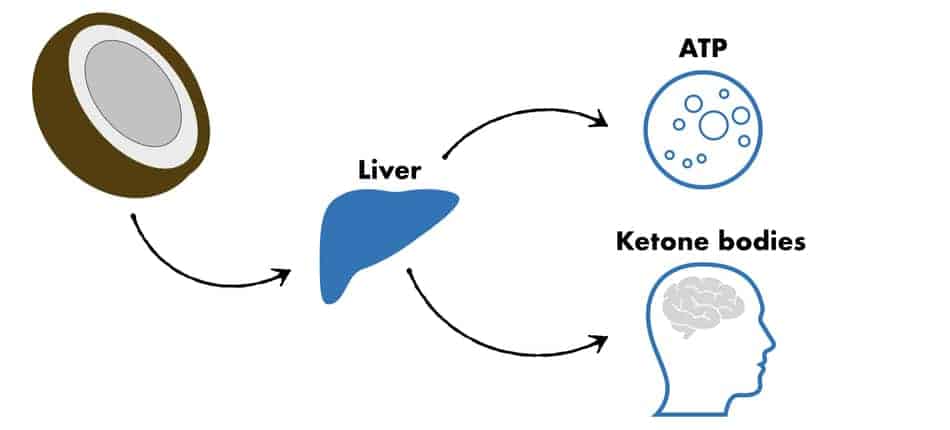
Fatty acids cannot pass the blood–brain barrier, therefore the brain primarily depends on ketones. Besides that, ketone bodies are being used as energy for the rest of the body, too. They enter mitochondria, get converted into acetyl-CoA, and oxidize to produce ATP (source).
So if you’re doing ADF, OMAD, or any other type of intermittent fasting, your goal is to stay in the fasted state for the main portion of the day. Therefore, consuming a small amount of coconut oil will help get on your feet, lower hunger, and still stay in ketosis.
Can I Drink Coconut Oil Before Bed?
You can either eat or drink a spoonful of coconut oil before bed because it doesn’t contain any carbohydrates therefore, it doesn’t trigger the release of insulin. Eating coconut oil before bed can reduce hunger, enhance fat burning, protect your skin, and supply a wide range of antioxidants.
The metabolism of coconut oil is significantly different, comparing to the long-chain fatty acids. Coconut oil is immediately broken down in the saliva and stomach, from where is being shuttled into the liver. Your liver then converts that into energy.
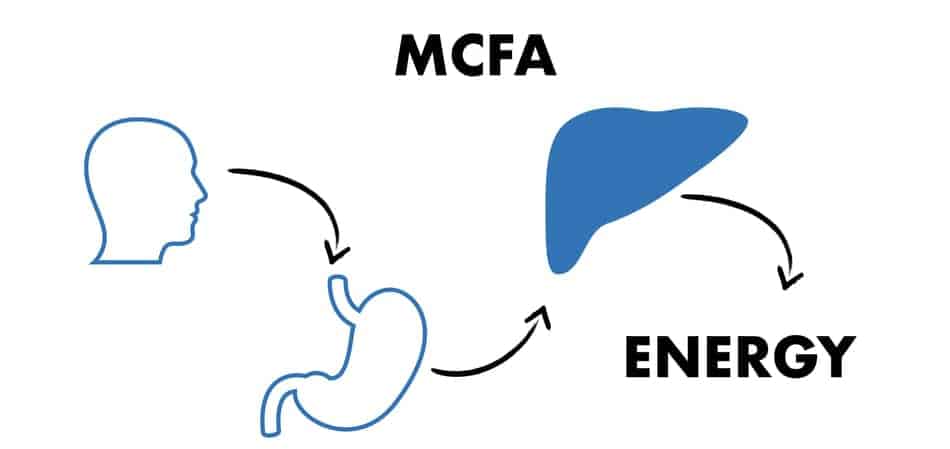
But with the long-chain fatty acids is different.
Normally, any long-chain fatty acids will need to get digested by pancreatic fat-digesting enzymes and transferred to the lymphatic system via lipoproteins, bypassing the liver.
From there, circulating lipoproteins contribute to the accumulation of fat in the various body tissues and artery walls. This of course can lead to storing fat.
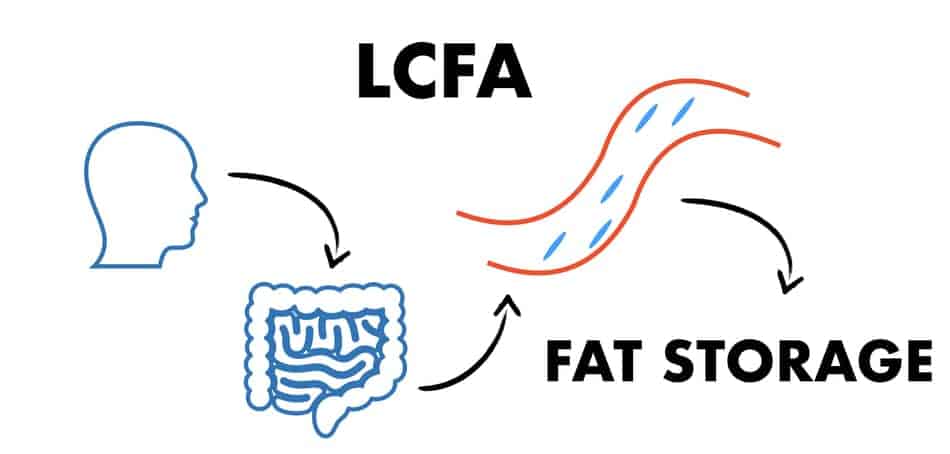
So having a spoonful of coconut oil won’t make you store the fat. Instead, it can lower your hunger and increase satiety, especially if you’re on a caloric restriction diet or doing intermittent fasting.
Related article: Can I Eat Pork At Night?
Does Coconut Oil Break A Fast?
A spoonful of coconut oil doesn’t break a fast because it doesn’t contain any sugar. The fasted state can be broken by the feeding state, which is when the pancreas triggers insulin release after you consume a high volume of food, foods, or drinks that contain carbohydrates.
Of course, eating the whole jar will have a detrimental effect and can make you feel progressively worse. However, eating a spoonful to suppress appetite while doing fasting won’t break the fast.
On the flip side, if you’re having a coconut water, that has relatively high sugar content, it will stimulate insulin, and therefore break the fast.
Related article: Can I Drink Coconut Water On OMAD?
Can I Eat Coconut Oil With A Spoon?
You can eat coconut oil with a spoon straight from the jar in the raw form. Coconut oil has been a major source of dietary fats in tropical countries for centuries. It can be consumed raw, straight from the jar, in the coffee, or as a substitute for cooking oil.
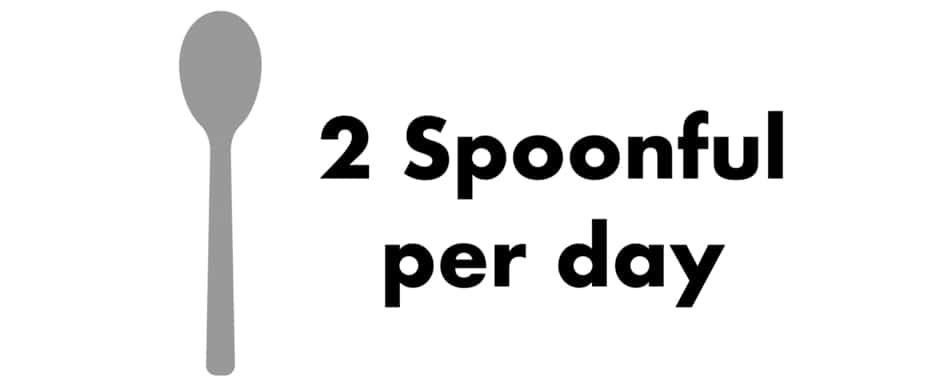
This means it doesn’t need to have any preparations. You can simply take a spoon and eat it, or dip your finger in the jar. However, eating more than a spoonful several times a day can have more adverse reactions. So limit yourself to 2 spoonfuls of coconut oil per day.
In Conclusion
You can eat coconut oil in the morning and it will help you get through the hunger pangs. There are studies done on coconut oil that it may lead to high LDL and other health risks. And eating more saturated fats will lead to further complications.
So here’s my point.
If you’re already doing intermittent fasting or any caloric restriction diet, that means you’re already in a caloric deficit. And the longer you diet, the more cravings and pressure for food you get. That’s just how it is.
So when you’re in a caloric deficit, having a single spoon of coconut oil will make zero difference in your LDL but can help enormously with regulating your cravings and therefore help you keep going.
So if that’s the case, then don’t stress about saturated fats.
Related Questions
How to eat coconut oil for weight loss
You can eat coconut oil for weight loss simply by having one spoonful of coconut oil first thing in the morning and the second one during the day when you feel your cravings are the highest. This will help you lower hunger and keep you more consistent.
Is it OK to eat coconut oil by itself?
It is ok to eat coconut oil by itself because it doesn’t require any processing, cooking, heating, or preparation. It can be eaten on its own, without any other foods, or drinks. You can use a spoon or simply dip your finger in the jar.
Best time to take coconut oil for weight loss
The best time to take coconut oil for weight loss is in the morning on an empty stomach because it will lower the hunger and give you instant energy. Coconut oil is digested and transformed into the liver where it is immediately used for energy.
